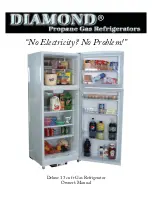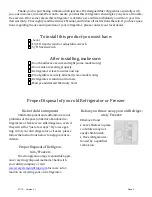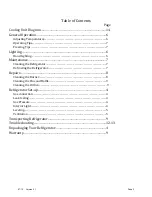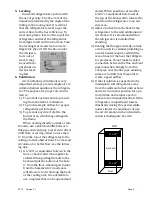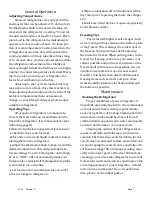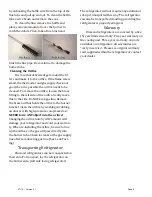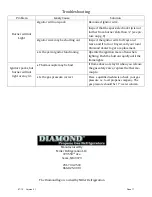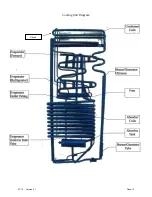
General Operation
Adjusting Temperatures
Diamond
refrigerators are equipped with a
thermostat that can be adjusted. To do this, turn
the thermostat knob to the desired setting. Al-
ways start the refrigerator at setting “3” and let
the unit cool down for at least 8-12 hours. Then
place food in the refrigerator in small amounts
spread out every couple of hours. If a large por-
tion of room temperature food is placed into the
refrigerator at one time, this will overload the
cooling system and it may take three times long-
er to recover. Once you have placed the food into
the refrigerator, allow the unit to stabilize at
least overnight. Adjust the thermostat to a higher
number if a colder temperature is desired. Warn-
ing: the colder you turn your refrigerator, the
faster frost will build up on the fins.
Adjusting to the correct temperatures may
take a span of a few days. Once this is achieved,
then adjusting should only need to be done if the
ambient temperatures (between seasons)
change, or your lifestyle changes (more people
using the refrigerator).
Operating Tips
All propane refrigerators are manual de-
frost. If the frost build-up is solid between the
fins in the refrigerator, it is time to defrost. (See
defrosting page 8)
Follow the tips below to keep frost levels lower.
Check the door seals for leaks.
Place lids on food and liquid containers before
placing them in the refrigerator.
Adjust the thermostat knob to keep food at the
desired temperature. This will generallybe be-
tween settings 2 and 3. Turning the control high-
er, or to “MAX” will not necessarily make your
fridge colder, especially if thetemperature probe
is encased in ice on the fins.
Let food cool to room temperature or colder
prior to storage in refrigerator.
Wipe condensation off cold containers with a
dry towel prior to placing them into the refriger-
ator.
Limit how often the door is opened, especially
in hot humid weather.
Freezing Tips
For items with higher levels of sugar, such
as ice cream, put these items on the bottom plate
of the freezer. This is always the coldest spot in
the freezer. Chill warm items before placing
them into the freezer. When putting water in the
freezer for freezing, make sure your water is as
cold as possible and put these containers on the
freezer shelf with meat and vegetables. It is ad-
visable to use metal ice trays, because metal
transfers cold better than plastic. When quick-
freezing items such as water and juice, these
items should be placed as far back and towards
the bottom as possible.
Maintenance
Cleaning the Refrigerator
Proper cleanliness of your refrigerator is
important, especially the inside. A recommended
and convenient time is during regular mainte-
nance or right after defrosting. Cleaning both the
inside and outside should be done with a soft
cloth and mild soap and warm water solution. Do
not use a harsh cleaner or a coarse cloth.
Cleaning the outside of your refrigerator re-
quires a soft cloth and mild soap, warm water
solution. Check the door seals for debris, for this
can produce an unsealed surface and cold air can
escape. Keeping the seals clean is especially criti-
cal to assure longer life and proper sealing, espe-
cially in the lower parts of the door. When done
cleaning, you can wax the refrigerator to prevent
from minor scuffs and scratches and improve the
overall appearance of your refrigerator. A stand-
ard auto wax works great. Do not wax the han-
dles, plastic, or the rubber gasket.
Remove the front grille
07/12 Version 3.1
Page 7

